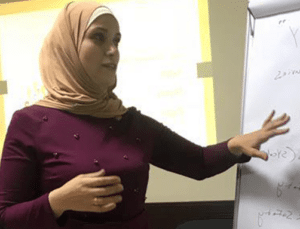In line with Sustainable Development Goal 3, namely, ensuring good health and wellbeing, Better Work Jordan is boosting mental health support for workers in the garment sector.
Amman – A collaboration between Caritas and the General Trade Union of Workers in Textile Garment & Clothing, has delivered a pilot training on psychological first aid to Better Work factories’ welfare committees. The pilot aims to equip the committees with the awareness to identify workers who may be experiencing a mental health issue and to provide a humane response to those suffering from any discomfort in the workplace.
Although it is increasingly recognized that workers’ mental wellbeing is a crucial determinant of their overall health; social stigma, a lack of knowledge and language barriers have prevented migrant garment workers from receiving adequate support in the past.
Caritas psychologist and counsellor, Lana Snobar, spoke of the importance of breaking down these barriers: “We know that the best way to tackle mental health issues is to raise awareness collectively and to jointly fight loneliness by creating a supportive environment.”

The training is timely, as Monday 10th of September marks the Word Suicide Prevention Day, an opportunity to promote understanding around mental health and spread the word on the importance of community support in preventing mental illness.
Welfare committees were recently set up in leading factories in response to an increased number of reported cases of depression in the garment sector, especially among migrant workers. Acting as focal point for workers, they pave the way to open communication among workers, management and unions.
Saravana Priyai, welfare committee member and chief of the ladies’ dorm of the Tusker factory in the north of Jordan, shared her impressions: “The training session taught me few things to think about during counseling…like the importance of the counsellor’s body language, the importance of keeping the discussion confidential and the need to keep an open mind while listening to the worker.”
Identifying the root causes of mental health problems in workers is challenging as they cannot be isolated from domestic issues or other struggles emerging from outside the workplace. The General Trade Union of Workers in Textile Garment and Clothing therefore holds a crucial role in addressing this multifaceted issue, given its close ties with workers and its mandate lobbying for both better living and working conditions. Union officer Emen Nasrallah commented on the training “It was extremely enlightening for us,” she said, “As union representatives, our role is to ensure that all elements of occupational health and safety are accounted for, including mental health. “
Holistically addressing the issue of workers’ wellbeing was highlighted as a top priority by buyers when stakeholders convened at the most recent multi stakeholders’ forum. Research has shown that workers’ mental health issues can have an impact on employers and businesses directly through increased absenteeism as well as reduced productivity and profits.
Better Work Jordan aims to mobilize stakeholders around the issue. Maysa Al-Hmouz, Better Work Enterprise Advisor and mental health focal point explained: “We believe that everyone has the right to support when dealing with mental health problems. The welfare committees are great examples to promote on the factory level but Better Work is committed to strengthening knowledge sharing on this topic by jointly working with all partners.”